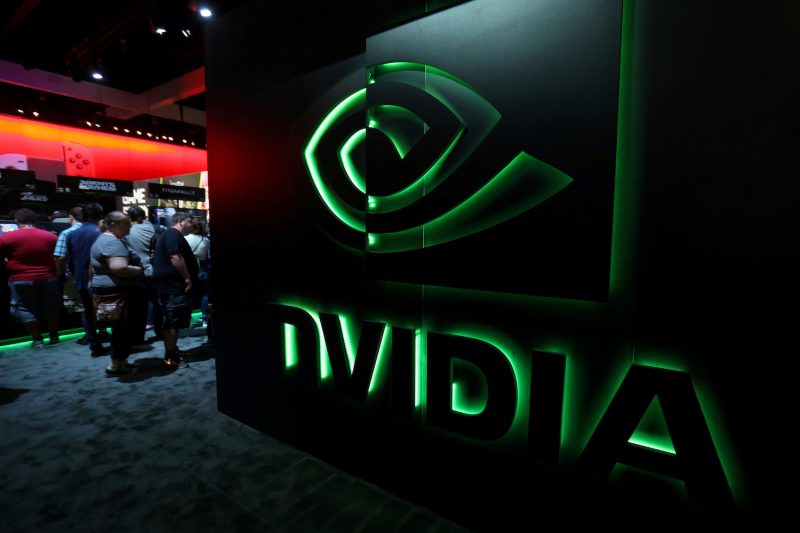Nvidia is planning to launch its new slower artificial intelligence (AI) chip for China in the second quarter of this year, sources say, but recent reports suggest the US chipmaker may be in for a disappointment.
Nvidia’s H20 chip is the most powerful of three chips it created for China so as to meet export restrictions announced by Washington in October.
But top Chinese cloud firms have told Nvidia they do not want its slower artificial intelligence chips, according to a report by the Wall Street Journal.
Also on AF: Nvidia Launches Modified Gaming Chip For Chinese Market
China’s Tencent and Alibaba told Nvidia that they will purchase only a few AI chips from the US chipmaker, the WSJ said, adding that the two firms said they would prefer using homegrown chips from companies such as Huawei.
The H20 was originally scheduled for launch last November but that plan was delayed, with sources saying the delay was due to issues server manufacturers were having in integrating the chip.
One of the people familiar with the matter said the company’s initial production volume will be limited, with Nvidia set to primarily fulfill orders for major customers. Both people declined to be identified as the information was confidential. Nvidia declined to comment.
China’s AI giants cool on ‘downgraded’ chips
Reuters previously reported that Chinese companies are reluctant to buy the downgraded H20 and are testing domestic alternatives amid fear the US could again tighten restrictions.
Alibaba and Tencent plan to place much smaller orders for Nvidia’s slower AI chips as compared to those for faster ones — like the A800 and H800, the WSJ reported.
Exports of both chips were banned under expanded US export controls last year.
The A800 and H800 themselves were introduced as alternatives for Chinese customers in November 2022 about a month after the US first restricted exports of advanced microchips and equipment to China.
The two Chinese tech giants have told Nvidia that they will be switching to domestic firms for some advanced chip orders, WSJ reported. They also plan to use more chips that they can “develop in-house”, the report added.
View this post on Instagram
Race for market share
In addition to the H20, Nvidia has planned two other chips that comply with the new restrictions – the L20 and L2. The chipmaker has yet to announce the sale of any of the three.
The H20, L20 and L2 include most of Nvidia’s newest features for AI work but with computing power cut back to comply with the new rules, according to SemiAnalysis’ analysis of the chips’ specifications.
In late December, it launched a modified version of an advanced gaming chip designed to comply with the new rules.
Nvidia is betting on the chips to help preserve its market share in China, where it has so far claimed a 90% share of the AI chip market.
But rivals like Huawei are vying for a slice of that pie, betting that US chip export controls will only tighten over time.
That has meant that firms such as internet giant Baidu and Tencent, that rely on AI chips for their cloud services, are now looking to buy an increasing number of chips made at home.
Huawei biggest competitor
Last year, following the US tightening its chip curbs in October, Baidu placed a $62 million order with Huawei for its AI chips, in a shift away from Nvidia.
For its part, Huawei has taken the lead among domestic rivals in developing homegrown AI chips.
Analysts and some Chinese AI firms like iFlyTek have said that the US sanctioned firm’s Ascend AI chips are comparable to Nvidia A100 in terms of raw computing power.
iFlyTek has been using the Ascend 910 to train its AI models.
According to the WSJ report, downgraded Nvidia chips have also translated into a narrower performance gap with Chinese chipmakers.
That has made domestically-developed chips “increasingly attractive” to Chinese buyers, WSJ said.
Among other firms signalling reduced interest in Nvidia’s chips are China’s top AI firms Baidu and TikTok owner ByteDance, WSJ said.
- Vishakha Saxena, with Reuters and additional editing by Jim Pollard
Note: This report was originally published on January 7, 2024 and updated with additional information regarding Nvidia’s planned chip launch on January 8.
Also read:
China Firms Rush to Poach Nvidia Clients With AI Chip Offerings
US Curbs Set Off Sales, Tech Boom for China Chip Equipment Firms
Raimondo’s Nvidia Chip Warning, Vow of Firmer Curbs Irks China
US Chip Export Ban Seen as Big Opportunity for Huawei
Huawei, US-Sanctioned Firms Win as China Dumps Western Tech
Threat of More Chip Curbs Spurs Warnings on China Innovation
Chinese Chip Firms Closed at a Record Rate in 2023 – TH
























